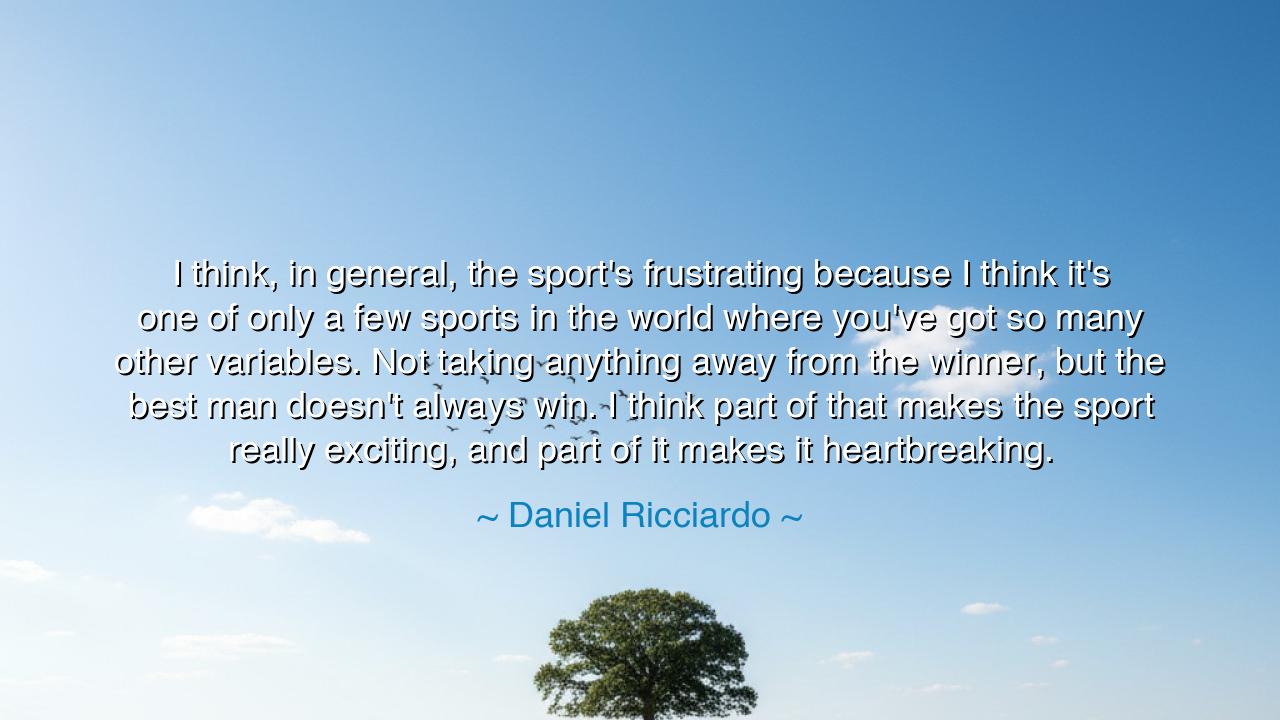
I think, in general, the sport's frustrating because I think
I think, in general, the sport's frustrating because I think it's one of only a few sports in the world where you've got so many other variables. Not taking anything away from the winner, but the best man doesn't always win. I think part of that makes the sport really exciting, and part of it makes it heartbreaking.






Hearken, O children of endeavor, and attend the words of Daniel Ricciardo, who spoke with the candor of one who has felt both triumph and heartbreak upon the arena of speed: “I think, in general, the sport's frustrating because I think it's one of only a few sports in the world where you've got so many other variables. Not taking anything away from the winner, but the best man doesn't always win. I think part of that makes the sport really exciting, and part of it makes it heartbreaking.” In these words lies the paradox of human pursuit: that victory is never assured, that excellence and fortune do not always align, and that the beauty of competition is inseparable from its sorrow.
The origin of this insight is grounded in the unforgiving world of motorsport, where Ricciardo has forged his craft. In Formula 1, each race is a crucible of skill, strategy, and circumstance, where weather, machinery, and chance conspire alongside human mastery. Here, one may drive with perfection and yet be thwarted by factors beyond control—a sudden downpour, a mechanical fault, or the misjudgment of another. The best man, as Ricciardo laments, does not always cross the finish line first, and in this lies both frustration and the inexhaustible thrill of the sport.
Consider the tale of Ayrton Senna, whose brilliance on the track is legend. There were races where he commanded skill, speed, and focus, yet was denied victory by mechanical failure or circumstance. And yet, these trials only magnified the drama, the awe, and the devotion of fans who understood that mastery alone does not dictate fortune. Ricciardo’s words echo this timeless lesson: the heart of sport is not solely in triumph, but in the interplay of ability, chance, and endurance.
This paradox is reflected across the ages. The gladiators of Rome, the wrestlers of Olympia, the charioteers of the Nile—each faced the same truth: skill alone did not guarantee victory. Many a champion fell to fate, injury, or misfortune. And yet, the struggle itself, the courage to compete, the dedication to preparation, became a testament to human spirit. The heartbreak of near triumph is inseparable from the joy of victory; without one, the other would lose its depth and meaning.
The excitement of such a sport lies precisely in its uncertainty, for the spectator and the participant alike. To witness a race, a contest, or a duel where outcomes hang by threads, where the unforeseen can crown the underdog, is to experience life itself in miniature—a reminder that the world is seldom predictable, and that every moment of effort, concentration, and risk carries weight beyond measure. This is the duality Ricciardo celebrates: heartbreaking and exhilarating, in equal measure.
From this reflection, a lesson emerges for all who strive: excellence is a virtue, yet it is not always rewarded with certainty. Life, like sport, is influenced by variables beyond one’s control. The wise heart learns to pursue mastery for its own sake, to cherish effort, resilience, and integrity, and to recognize that setbacks are as instructive as victories. To compete fully, regardless of outcome, is to embody the highest ideal of human endeavor.
Practical action flows naturally: in your endeavors, whether on the field, in the office, or within personal pursuits, strive for skill, preparation, and dedication, but temper expectation with humility. Accept that variables—chance, circumstance, and the actions of others—shape outcomes. Celebrate effort as much as result, and learn to find meaning in perseverance, adaptability, and courage.
Thus, let the words of Daniel Ricciardo endure: sport—and life—are at once thrilling and sorrowful, dictated by skill, strategy, and the unpredictable currents of fate. Embrace this duality, compete with heart, and understand that true excellence lies not only in victory, but in the courage to face uncertainty, to endure heartbreak, and to rise to meet every challenge anew.






AAdministratorAdministrator
Welcome, honored guests. Please leave a comment, we will respond soon